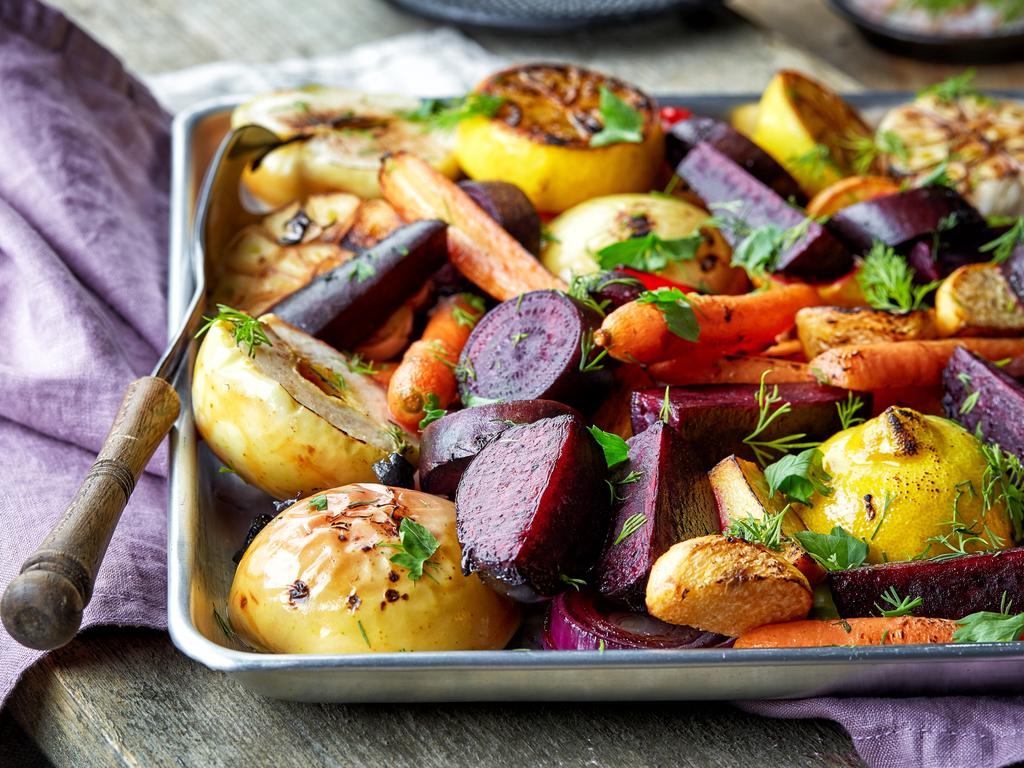The protein con: swap the bar for a piece of fruit
Food marketers have jumped on the protein bandwagon. But most of us don’t need more of the stuff in our diets. So what’s going on?

It’s a fad that started with gym junkies, but the obsession with eating more protein has now become mainstream.
Australian consumers are being bombarded with foods marketed as having extra protein – high-protein yoghurts, protein water and all manner of protein bars and shakes.
Then there’s the meat-heavy, plant-free, carnivore diet beloved by the likes of Joe Rogan and his followers.
With all this focus on protein we must be battling with a serious population-wide protein deficiency issue, right? Well … no, actually.
If you’re eating a reasonable amount of food as part of a balanced diet, you’re most likely getting all the protein your body needs. In fact an impressive 99 per cent of Australians meet the protein recommendations.
Fibre, calcium and omega 3 fats could only wish for numbers like that.
Aside from those who are eating smaller food portions – such as the elderly, people with chronic illness, and those on strict diets – almost all of us get a gold star when it comes to protein consumption.
So why all the fuss around protein?
Well, because it’s good for business. Carbs have been getting a bad rap for decades – even though most of us aren’t getting enough fibre, which can be found in carbohydrate-rich foods such as fruits, vegetables and wholegrain breads and cereals.
Fats have been through similar demonisation – even though unsaturated fats found in oily fish, olive oil and nuts are a mainstay of the heart-friendly Mediterranean diet.
That leaves one final “macro” for food companies to make money off: protein, and we can see this playing out on our supermarket shelves, with even already high-protein foods such as yoghurts and milks now with added protein – and added cost.
Then there’s the influence of social media. You too could look like your favourite fitness influencer if you just use this protein powder they’re promoting – forgetting the fact that hours of strength training, and possibly other “supplements” are what really got them that toned physique.
When sold these types of results, it’s tempting to think that protein-boosted products are the secret to better health and fitness. But don’t be too quick to drink the Kool-Aid on protein-boosting. A well-chosen balance in dietary intake is a far better way to go.
What proteins should we be eating for good heart health?

Think protein and you likely think meat – in particular red meat. But we know that high saturated fat intake that comes with red meat is associated with increased risk of cardiovascular and other diseases.
So rather than focusing on eating more protein, the best way to improve our heart and overall health is to make some heart-healthy protein swaps.
This includes eating more protein sources that are lower in saturated fat, and higher in fibre, omega 3 fats, along with essential vitamins and minerals. This includes seafood, in particular oily fish, legumes, seeds, nuts, eggs, tofu, low-fat dairy and wholegrain breads and cereals.
But you can’t get enough protein from plants

Despite this myth, plant-based protein is the type of protein we should be including more of in our diet. Particularly as less than 20 per cent of Australian adults get the recommended daily fibre intake that’s associated with reduced risk of chronic disease.
This lack of fibre impacts not only rates of bowel cancer, but fibre also plays an important role in heart health as it can help to reduce LDL “bad” cholesterol, lower blood pressure and control blood sugar levels.
While it is true that plant foods are more likely to be incomplete protein sources – aka they don’t include all nine essential amino acids – this is easy to overcome simply by combining different protein sources into your meals. These combos of foods are known as “complementary proteins” and include popular pairings such as rice and beans, or nut butter and wholegrain bread.
If not protein supplements, then what?

Protein supplements certainly have a role to play for those who struggle to get enough protein – such as the elderly, chronically ill, people on restricted diets, athletes doing high-volume training, and those who have protein-losing disorders (specific protein-losing conditions affecting the small and large intestine, or the kidneys). However, for the rest of us, our attention would be better spent on the areas of nutrition where we are truly dropping the ball.
Less than 10 per cent of us eat enough fruits and vegetables – so start snacking on fruit and nuts instead of that protein bar. More than half of us aren’t getting enough calcium – so have a (cheaper and non-protein boosted) yoghurt rather than that protein shake. And only 20 per cent of us get enough omega 3 fats – so swap that steak for salmon.
But mostly importantly, take in any nutrition advice with a critical mind – particularly when there is big money to be made.
Professor Jason Kovacic is director and chief executive of the Victor Chang Cardiac Research Institute.
This column is published for information purposes only. It is not intended to be used as medical advice and should not be relied on as a substitute for independent professional advice about your personal health or a medical condition from your doctor or other qualified health professional.




To join the conversation, please log in. Don't have an account? Register
Join the conversation, you are commenting as Logout